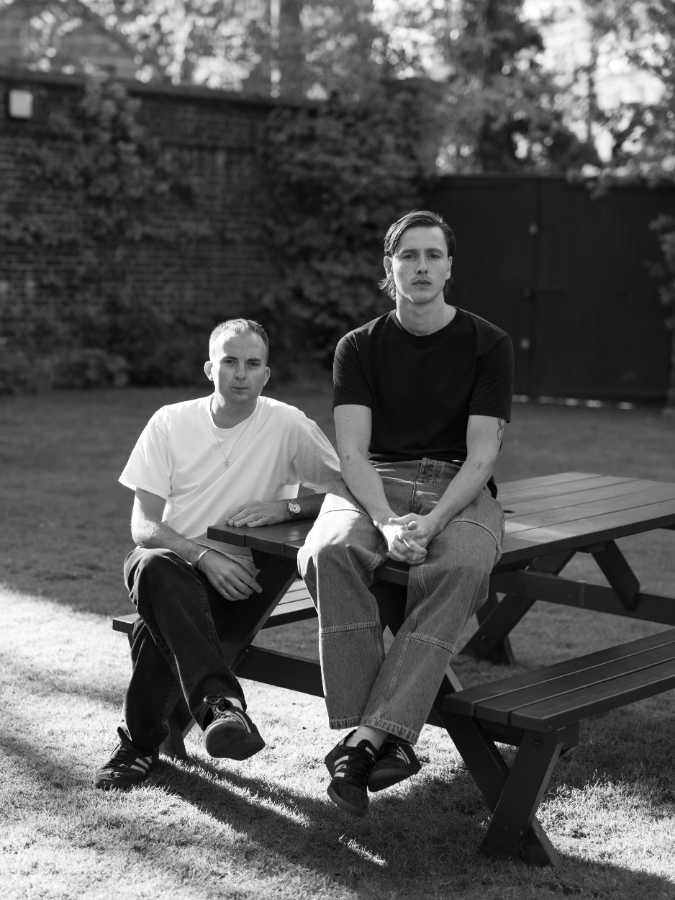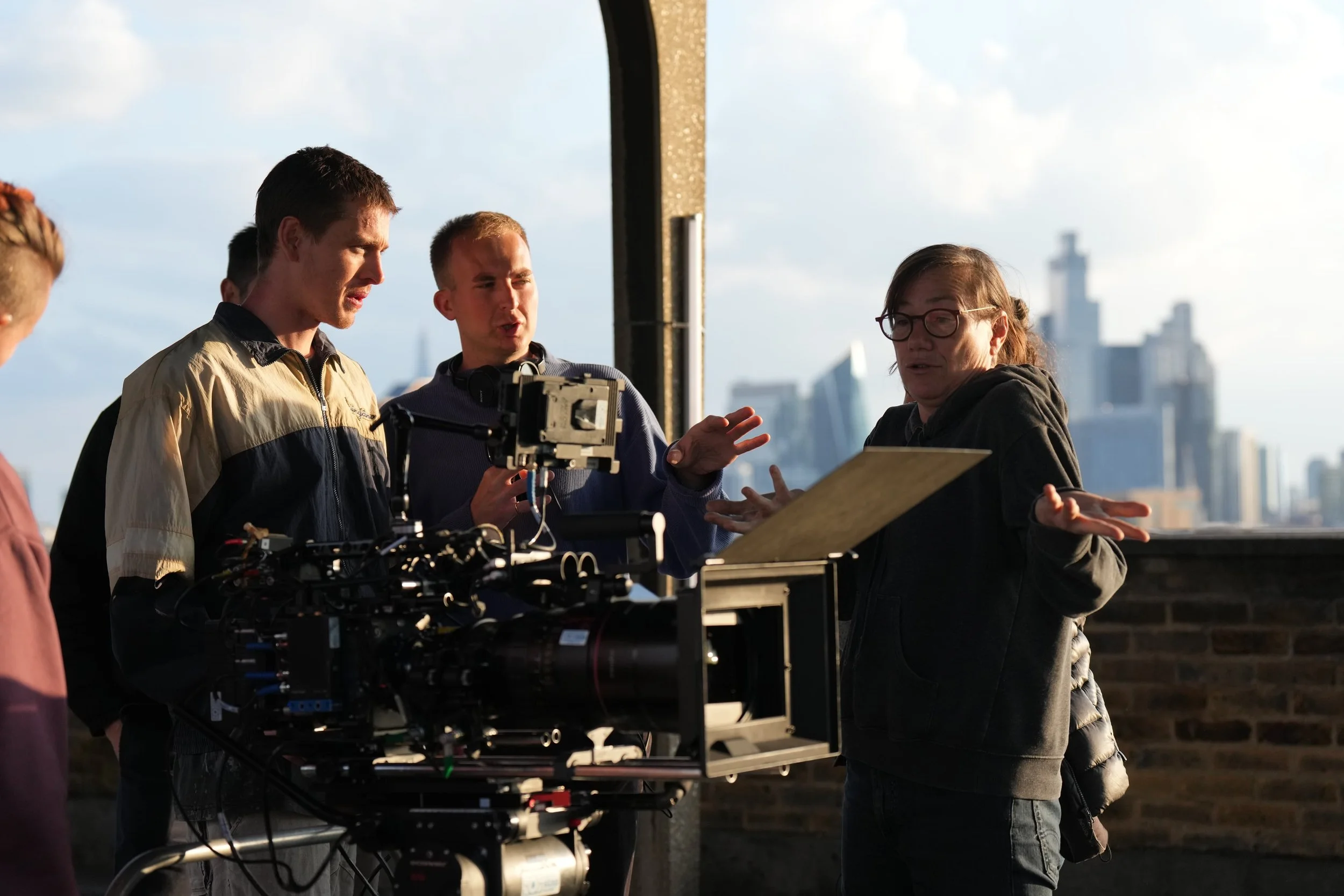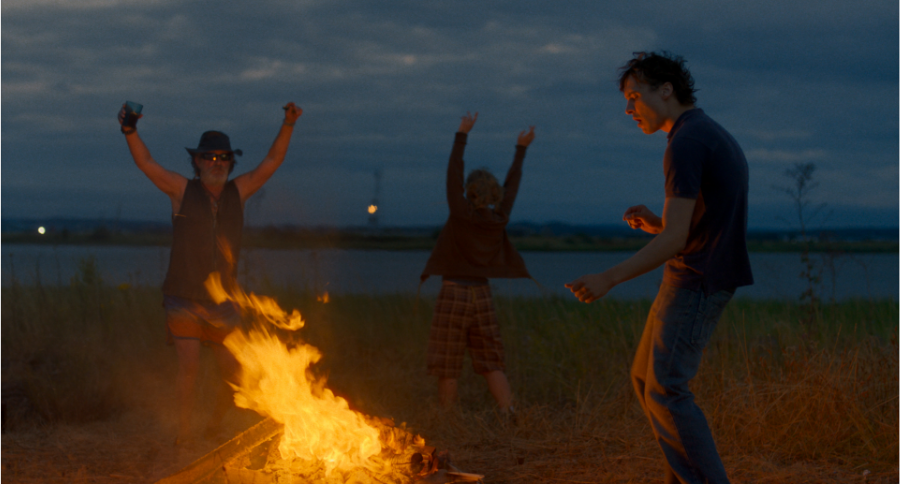Fresh off a summer of film festival buzz, Lia Gomez-Lang spoke to Devisio Pictures’s Archie Pearch about his creative collaboration with co-founder Harris Dickinson, and his ongoing dedication to shorts. Earlier this year, Devisio released their first feature film, and Dickinson’s directorial debut, Urchin, which premiered at the Cannes Film Festival and will be released in the UK on 3rd October 2025.
30 September 2025
Lia Gomez-Lang
Archie Pearch and Harris Dickinson of Devisio Picture | Image c/o Aria Shahrokhshahi
Lia Gomez-Lang: How did you get into producing short films?
Archie Pearch: As soon as I left school, I jumped straight into working on commercials and film. My introduction to short filmmaking was working on Three Women Wait For Death. I used to pick up the lead cast and drive her to set everyday with a newspaper and a coffee. I was terrified! It was the first time I was really involved in the film world, and it gave me the bug. After that, I started thinking about how I could produce films myself.
LGL: Could you tell us a bit more about your transition from producing short films to features? How did you balance short filmmaking around larger scale film projects?
AP: Whilst I was working in-house at film production companies I still wanted to keep shorts going, so I always made time for them each week, partly because I just really enjoyed it, and also because I wanted to be part of a network and community of people at a similar level to me. It was fun! On our weekends we’d go and shoot for two days then come back into work exhausted, then do it all again. It was a great time where you could be earning money during the week, but also creating what you wanted outside of working hours.
LGL: What types of stories are you drawn to producing?
AP: For me, being queer, I’m definitely attracted to stories about being an outsider in some way or another – we have lots of those kinds of projects on our slate. I want us to keep making films we want to make, not necessarily the films the market is telling us people want to see. People like Molly Manning-Walker or Charlotte Reagan in the UK are part of this new wave and we want to follow in their footsteps.
LGL: What has your experience been with producing a short-to-feature? The term ‘proof-of-concept’ is used a lot when moving between these spaces.
AP: A great example of where it has been done well is Whiplash or Martha, Marcy, May, Marlene where it definitely made sense for the short to transition into a feature, but that’s not always the case. It’s hard because the two formats are totally different. Often, what lives in a short should sometimes just stay in a short! Trying to recreate the feeling and world of a short in feature form can be really tricky and it doesn’t always work well. Sometimes with shorts it’s best to establish something strong within that ten or fifteen minutes, show who you are as a filmmaker and then, on a larger scale project, do something totally different. There are examples of where it’s been done well, like
Harris Dickinson and Archie Pearch on the set of Urchin. Image c/o Dean Rogers
LGL: Can you tell us about your creative collaboration with Harris Dickinson, both in working on short films and your debut feature through Devisio, Urchin?
AP: Harris and I met when he reached out to me to produce 2003 and we now run Devisio together. We understand each other in a way that other people might not. There's a real honesty and trust between us, and it’s what makes our creative collaboration work so well. When we made Urchin, we had another producer Scott O’Donnell from Somesuch join us and share the load – we believe in collaboration over ego for sure, and it was clear that Scott had the same feeling and honesty. The two films were very different but the creative set up was pretty much the same.
LGL: Any short films on the horizon with Devisio?
AP: We’ve made two shorts already, one with a filmmaker called Martin Aleman which stars Emma Mackey, Vicky Kreips, Stacey Martin and Denis Lavant - a true cast. Martin wanted to make a feature and we wanted to make a short together ahead of this. The other is a beautiful short with Rob Harris that’s coming out soon. In terms of our other projects we are trying to focus primarily on features and TV, but if something truly special came in the form of a short film, then we’d a hundred percent do it.
LGL: Looking back on your work, is there anything you wish you’d known at the start?
AP: I wish someone had said to me, it’s ok to get it wrong. Those early years are so important to experiment – and to fail – because that’s when you can really learn. I was always aiming for perfection. I’ll never forget when David Heyman [founder of Heyday Films] told me, “I’m learning every day.” When a producer of that scale says that, you really have to listen. My other piece of advice is when you’re working on a film, to have a range of levels of experience across all of the crew. Everyone is stepping up in one way or another and mixing up in crews means each person in the team can learn and build in the right way. Also, I would urge all filmmakers to keep thinking about the projects that really satisfy you and allow you to develop your career. I’ve now produced sixteen shorts and learnt so much from that - making some of those have been the best times.
LGL: Have you watched any shorts recently you’d recommend?
AP: I loved Matty Crawford’s Stomach Bug and Marion by Finn Constantine and Joe Weiland. We saw an incredible short at SXSW called Nervous Energy by Eve Liu which I really enjoyed. Wander to Wonder is also great, and as an old throwback there’s a beautiful feature film called Murina by Antoneta Alamat Kusijanović. She did a short film called Into the Blue which I loved, and it was a brilliant transition into Murina.
Still from Urchin. Image Anthony Dickenson



